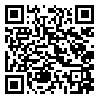Volume 68, Issue 10 (5 2011)
Tehran Univ Med J 2011, 68(10): 570-577 |
Back to browse issues page
Download citation:
BibTeX | RIS | EndNote | Medlars | ProCite | Reference Manager | RefWorks
Send citation to:



BibTeX | RIS | EndNote | Medlars | ProCite | Reference Manager | RefWorks
Send citation to:
M B, SA T Z, M S. The effects of prenatal sound stress on the spatial learning and memory of rat's male offspring. Tehran Univ Med J 2011; 68 (10) :570-577
URL: http://tumj.tums.ac.ir/article-1-300-en.html
URL: http://tumj.tums.ac.ir/article-1-300-en.html
1- , talaei@kaums.ac.ir
Abstract: (5203 Views)
Background: Numerous evidences indicate that various environmental stresses during
pregnancy affect physiological behavior of the offspring. This experimental
study was designed to investigate the effect of noise stress during prenatal
period of rats on spatial learning and memory and plasma corticostrone level in
postnatal life.
Methods: Three groups of pregnant rats were given daily noise stress with durations of two and/ or four hours in last week of pregnancy period. The fourth group was left unstressed. The male offspring from the unstressed and different stressed groups were assigned as controls and stressed groups. The animals were introduced to a spatial task in Morris water maze 4 trials/day for five consecutive days. The probe test was performed on the 5th day of the experiment. The delay in findings and the distance passed to locate the target platform were assessed as the spatial learning.
Results: Our results showed that prenatal exposure to noise stress for two and/ or four hours a day, leads to impaired acquisition of spatial learning in the postnatal animals. The plasma level of corticostrone in the two stressed groups of rats markedly matched with their behavioral function. Prenatal exposure to 1- hour noise stress revealed no effects on the offsprings' behavior and plasma corticostrone level.
Conclusion: Based on our study results, it seems that applied range of stress which is executed through the noise stress could increase the plasma corticostrone level and could decrease spatial learning and memory of adult male offspring.
Methods: Three groups of pregnant rats were given daily noise stress with durations of two and/ or four hours in last week of pregnancy period. The fourth group was left unstressed. The male offspring from the unstressed and different stressed groups were assigned as controls and stressed groups. The animals were introduced to a spatial task in Morris water maze 4 trials/day for five consecutive days. The probe test was performed on the 5th day of the experiment. The delay in findings and the distance passed to locate the target platform were assessed as the spatial learning.
Results: Our results showed that prenatal exposure to noise stress for two and/ or four hours a day, leads to impaired acquisition of spatial learning in the postnatal animals. The plasma level of corticostrone in the two stressed groups of rats markedly matched with their behavioral function. Prenatal exposure to 1- hour noise stress revealed no effects on the offsprings' behavior and plasma corticostrone level.
Conclusion: Based on our study results, it seems that applied range of stress which is executed through the noise stress could increase the plasma corticostrone level and could decrease spatial learning and memory of adult male offspring.
Send email to the article author
| Rights and permissions | |
 |
This work is licensed under a Creative Commons Attribution-NonCommercial 4.0 International License. |





